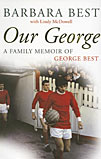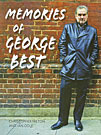 Our George: Family Memoir of George Best
Our George: Family Memoir of George Best
by Barbara Best with Lindy McDowell
Sidgwick & Jackson, £18.99
Reviewed by Joyce Woolridge
From WSC 255 May 2008
 Memories of George Best
Memories of George Best
by Christopher Hilton & Ian Cole
Sportsbooks, £14.99
Reviewed by Joyce Woolridge
From WSC 255 May 2008
These two very different books share a common theme: how George Best should be remembered, and who should determine how he is remembered. George Best produced four major autobiographies in his lifetime. The last, Blessed, was a serious attempt at putting his side of the story for posterity. In Our George, one of Best’s sisters undertakes to reclaim her brother’s memory on behalf of part of his closest family.
This book begins where the second cannot go – to Best’s bedside in the Cromwell Hospital where he died – and there is an unvarnished and harrowing account of the pain Best and those who stayed with him went through before his artificial ventilator was switched off. It is a very personal memoir, full of the small, intimate details that only family would know. There are facsimiles of the first letters he sent home and the story of how his parents lay crying in bed as their eldest went off to Manchester to seek his fortune. There are also considerable gaps in the narrative. As can happen, the Bests had little contact with George once he became a big star, although Barbara rebuilt her relationship with her brother later. This is not a football book, but the George Best remembered in its pages is a flesh-and-blood character, an ordinary person with an extraordinary talent, one that, after reading it, you think you understand.
The handsomely illustrated Memories of George Best is exactly what its title says. The “others” George came into contact with, from Manchester to South Africa – some good friends, others acquaintances – recall their time with him and are quoted directly, in chapters organised around periods and aspects of his life. They speak of the George that his family couldn’t know.
The preamble begins with a scene-stealing revelation from Rodney Marsh, who claims that, as they travelled the country delivering their roadshow, Bestie told him in confidence five “bombshell” secrets, about events that changed his life. As these are never divulged and will “go to the grave” with Marsh, the reader is left dangling, although Rodney does hint later that one was a “medical” issue.
The format generally works well, although there is some repetition – for example we are constantly reminded that George was the “Fifth Beatle” – and some irritating pontification from his critics. The reconstruction of the game against Northampton Town where Best scored six is very well done.
In the end, both books tell us much about the pernicious effects of fame, not only on Best, but chiefly on the people who constantly pursued and tried to use him. At times, the Best family sat in their Belfast home under siege with the blinds drawn. According to Marsh, Best developed another, “defensive”, performing self, to cope with the hordes who worshipped and/or pestered him, but to whom, as both books show, he was invariably unfailingly polite.